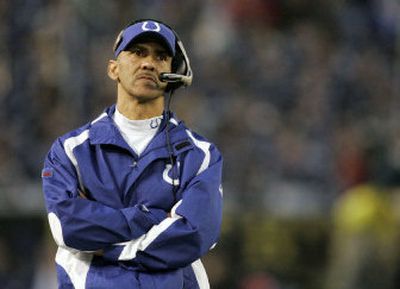Making strides at last

When Doug Williams became the first black quarterback to start a Super Bowl 19 years ago, the buildup to the game between his Washington Redskins and the Denver Broncos was “all Williams all the time.”
It included a question that always has been considered No. 1 on the list of wacky Super Bowl queries and has generated a controversy of its own: “How long have you been a black quarterback?”
The racial angle will be back twofold next week as close friends Tony Dungy of Indianapolis and Lovie Smith of Chicago become the first black coaches in the game. That theme overshadows all others, including Peyton Manning’s pursuit of his first Super Bowl ring and Dungy’s quest for validation as one of the best coaches of the last decade.
Still, it’s likely the coaches will be asked more about their skin color than about football. And given the 24/7 nature of news these days, the Dungy-Smith matchup could be the biggest Super Bowl sideshow since Williams’ trailblazing appearance, one in which he led the Redskins to a 42-10 victory.
“Nobody said the Washington Redskins against the Denver Broncos, which is what it really was,” says Williams, who threw for 340 yards and four touchdowns and was the game’s MVP. “It was me, a black quarterback, against the great John Elway.”
This week will be more than a sideshow. It will be a significant event that demonstrates there is still a lot to be discussed about race relations in the NFL and, by extension, in the United States.
“This is one of the great moments in American history,” the Rev. Jesse Jackson said this week. “It really is. It comes 60 years after Jackie Robinson broke through. It’s an American feel-good moment.”
There’s more to this game, of course:
“ Manning’s high profile and his chase for a Super Bowl ring to add to a string of accomplishments in nine seasons, including two MVP awards and a single-season record for touchdown passes.
“ The comparison between these Bears and their 1985 counterparts, the last Chicago team to make the Super Bowl.
“ Any number of individual stories that for a week will turn obscure offensive linemen and special teamers into objects of worldwide scrutiny.
None of the craziness is new.
Back in the prehistoric days of Super Bowldom, when there were 300-400 media members instead of 3,000-4,000, the NFL still provided a week to fill up notebooks and tape recorders with any and every arcane detail.
The pregame frenzy remains the same, although there are more ways to speed the information overload on its way via the Internet and round-the-clock sports radio and television, including the league’s own TV network.
The memorable wackiness has covered most of the game’s 40 years.
There was Joe Namath’s “guarantee” in 1969 that the 18-point underdog Jets would beat the Colts (they did). Jim McMahon’s daily travails in 1986, the last time the Bears were in the game. And Brian Billick’s blowup in defense of Ray Lewis paired with Kerry Collins’ mea culpa about his drinking problems in 2001, when Billick’s Ravens beat the Giants, quarterbacked by Collins.
And, of course, the “look at me” antics of Deion Sanders, Ray Buchanan, Terrell Owens and many others who took advantage of football’s biggest stage to advertise themselves, although T.O. hardly needs a Super Bowl to do that.
“I guess I’ll just have to be satisfied with being the MVP,” Buffalo’s Thurman Thomas said in 1992 when he was reminded of that fact after complaining he didn’t get enough recognition.
Beyond the headliners, newly minted media stars come in all forms and colors during Super Bowl week, when questions range from the arcane details of Xs and Os to the legendary, “If you were a tree, what kind of tree would you be?”
Even before the Colts beat the Patriots and the Bears beat the Saints to advance to this game, people were anticipating it.
Before the championship games, both coaches were questioned repeatedly about the significance of their potential meeting. Dungy, the most frequent spokesman for black coaches, was reticent because, like any coach, he was reluctant to look beyond the game at hand to the next one, especially with no guarantee there would be a next one for Indy.
Now that both coaches have reached the summit, Dungy is prepared to answer the questions. And perhaps, bring an end to them.
Indianapolis defensive tackle Anthony “Booger” McFarland spoke for many of the black players in a league that is more than two-thirds black when he noted, “It shows that for Tony and Lovie to come this far that there are at least some organizations that have confidence that black men can be head coaches. I hope it goes beyond that so we don’t have to think of their race.”
Williams agrees, saying the victories by the two black coaches, along with the hiring of Jerry Reese as New York Giants general manager and Mike Tomlin as Pittsburgh’s coach, made last week the most significant for blacks in NFL history.
If that’s true, then all the questions about race they’ll be asked this week can only increase the spotlight on minority hiring – Williams’ success in the Super Bowl helped pave the way for the Steve McNairs, Donovan McNabbs, and other black quarterbacks who today are taken for granted.
As long as no one asks: “How long have you been a black coach?”